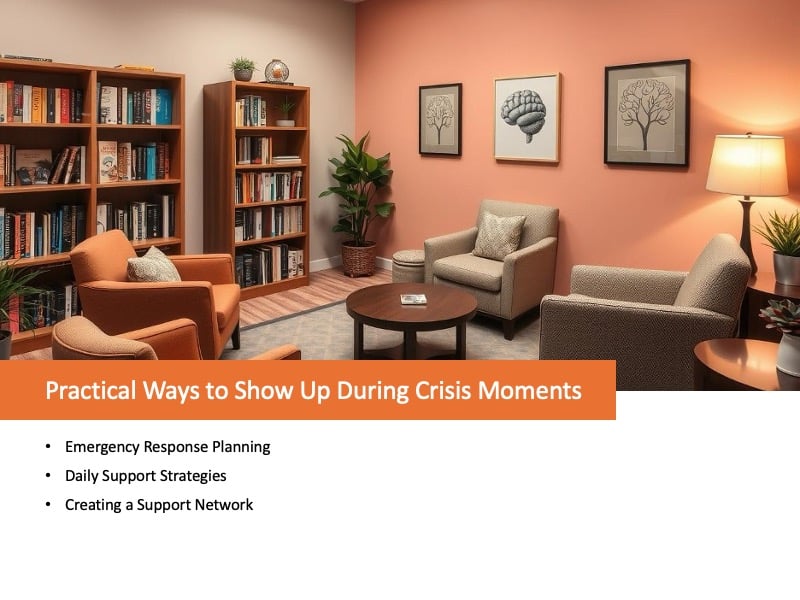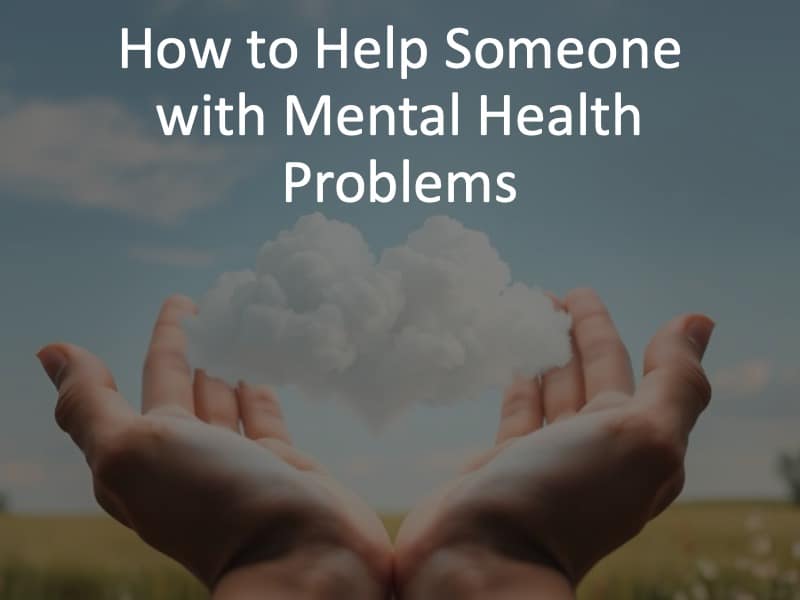How to Help Someone with Mental Health Problems
Helping someone with mental health problems can feel overwhelming, but it’s one of the most impactful roles we can play in their recovery.
Whether you’re a family member, friend, or caregiver, understanding the complexities of mental health, fostering a safe and compassionate environment, and offering meaningful assistance can significantly improve their well-being.
By equipping yourself with knowledge and empathy, you can provide the support they need to navigate their mental health journey.
Key Takeaways:
- Understand the common mental health conditions and their impact on your loved ones.
- Learn to recognize the warning signs and break down the stigma surrounding mental health.
- Cultivate a supportive environment by practicing active listening and effective communication.
- Encourage professional help and connect your loved ones with essential mental health resources.
- Prioritize self-care while maintaining healthy boundaries to sustain your support over the long term.
Understanding Mental Health Problems
Mental health issues like depression, anxiety, and bipolar disorder deeply affect people and their relationships.
These problems show up in many ways, making daily life hard and affecting overall happiness.
Common Mental Health Illnesses
Some common mental health issues include:
- Depression: It’s feeling sad, hopeless, and losing interest in things you used to enjoy.
- Anxiety Disorders: This includes feeling too worried or scared, like in generalized anxiety or social anxiety. It can also included other forms of anxiety, such as substance-induced anxiety disorder.
- Bipolar Disorder: It’s when mood, energy, and activity levels swing wildly, from being very high to very low.
Recognizing Warning Signs
Spotting mental health problems early is key to getting the right help. Look out for these signs:
- Big mood, energy, or sleep changes
- Struggling to focus or make choices
- Stepping back from friends or family
- Big changes in how much you eat or how much you weigh
- Feeling really down or thinking about harming yourself
Mental Health Stigmas
Unfortunately, mental health issues often face a lot of stigma. This makes it hard for people to get help. Talking openly and with kindness about mental health can help change this. It makes a space where those struggling feel supported.
“Mental health awareness is not just a personal responsibility, but a societal one. We all have a role to play in reducing the stigma and creating a more compassionate world.”
How to Help Someone with Mental Health Illness
Dealing with mental health issues can be tough and personal. As family, friends, or caregivers, we’re key in helping our loved ones.
By getting to know mental health, making a safe space, and helping out, we can really help.
Creating a Safe and Supportive Environment
Creating a safe and supportive home is key when helping loved ones with their mental health. It’s important to have open communication and a place where they feel safe to share. This way, they can express their feelings without fear of being judged.
To make a safe space, encourage your loved ones to talk openly. Let them share their thoughts and feelings without interrupting. Show them you’re there to support, not to judge or fix things.
Also, make sure your home is a judgment-free zone. Don’t make assumptions or judge their thoughts or actions. Show empathy and understanding, and let them know their feelings are valid and respected.
“The most important thing is to create a safe, supportive, and judgment-free environment where your loved ones feel comfortable opening up and sharing their struggles.”
By making your home a safe and supportive place, you help your loved ones feel heard and valued. This is a big step in their mental health journey.
Strategies for Cultivating a Safe and Supportive Environment
- Encourage open and honest communication
- Avoid judgment and create a judgment-free zone
- Validate your loved one’s emotions and experiences
- Offer a listening ear and emotional support
- Respect your loved one’s boundaries and privacy
Creating a safe and supportive home is a continuous effort. It takes patience, empathy, and a real commitment to your loved one’s well-being. By focusing on emotional safety and open communication, you can support them through their mental health challenges.
The Power of Active Listening and Empathy
Supporting loved ones with mental health issues is more than just being there. It’s about listening actively and with empathy.
This can deeply affect their well-being. By improving how we communicate and building trust, we create a safe space for healing.
Effective Communication Techniques
Active listening is more than just hearing words. It’s about fully engaging with the speaker. Ask questions and reflect what you’ve understood. Use techniques like paraphrasing and open-ended questions to show you care.
Building Trust Through Conversation
Trust is key in supporting mental health. Talk openly and honestly, letting your loved one share without fear. Be mindful of your body language and emotional support signals. They can greatly affect trust and comfort.
Non-Verbal Support Signals
Non-verbal cues can mean a lot. A gentle touch or a reassuring nod can show empathy. They let your loved one know you’re there for them.
“The greatest gift you can give someone is your active listening. When people feel heard and understood, they feel loved.”
By learning to listen actively and empathetically, you can help your loved ones feel safe. This creates a deeper connection and a supportive environment for their mental health journey.
Promoting Overall Wellness
Encouraging healthy habits like regular exercise and balanced nutrition can play a pivotal role in supporting someone with mental health challenges.
Gently guiding your loved one toward making these positive changes can improve both their physical and emotional well-being over time.
The Connection Between Exercise and Mental Health
There is a powerful connection between exercise and mental health.
Regular physical activity stimulates the release of endorphins and serotonin, chemicals that naturally elevate mood and reduce stress.
Activities like walking or light stretching can be a gentle starting point, especially for those who may feel overwhelmed by intense workouts.
Helping someone incorporate even small amounts of exercise into their daily routine, such as a 10-minute walk outdoors or simple bodyweight exercises, can make a noticeable difference.
This not only boosts their mood but also improves sleep quality, energy levels, and overall resilience to stress.
Choosing the Best Foods for Mental Health
Nutrition plays a significant role in supporting mental health.
Foods rich in omega-3 fatty acids, such as salmon, walnuts, and flaxseeds, can help regulate mood and reduce inflammation, and they are among the best foods for mental health.
Leafy greens, berries, and whole grains provide essential vitamins and antioxidants that support brain function and emotional balance.
Encourage your loved one to limit ultra-processed foods and sugar-laden snacks, which can contribute to mood swings and fatigue.
Instead, suggest incorporating more whole, nutrient-dense foods into their meals.
This could include simple swaps, like replacing chips with nuts or sugary drinks with herbal teas.
Avoid leaning into proposed herbal remedies, like kratom for anxiety, as these can temporarily mask symptoms and cause worse problems long-term.
Mental Health Support Resources and Services to Utilize
When facing mental health challenges, the right resources and services can help a lot. This guide will show you the many support options for individuals and their families.
Accessible Mental Health Resources
There are many mental health resources for different needs and preferences. These include:
- Online support groups for community and peer support
- Counseling and therapy services, both in-person and online, for all budgets and schedules
- Crisis hotlines for immediate support during tough times
- Educational materials and self-help tools for understanding and coping
Therapy Options
Therapy can be a big step in improving mental health. There are many types to choose from, including:
| Therapy Type | Description | Benefits |
| Individual Therapy | One-on-one sessions with a licensed mental health professional | Personalized attention, in-depth exploration of personal challenges |
| Group Therapy | Sessions with a therapist and a group of individuals facing similar issues | Peer support, shared experiences, and a sense of community |
| Family Therapy | Sessions involving family members to address interpersonal dynamics | Improved communication, conflict resolution, and family dynamics |
Crisis Support and Emergency Resources
In crisis or immediate distress, special support is available. Crisis hotlines and emergency services offer 24/7 help, including:
- National Suicide Prevention Lifeline: 1-800-273-8255
- Crisis Text Line: Text HOME to 741741
- Local emergency services: Dial 911 or visit the nearest emergency room
By exploring these mental health support resources and services, individuals and their loved ones can find the tools and guidance they need. This helps them navigate their mental health journey with more confidence and resilience.
Setting Healthy Boundaries While Providing Support

Caring for a loved one’s mental health is rewarding but challenging. As a caregiver, setting healthy boundaries is key. This prevents burnout and ensures you support them well.
We’ll look at how to balance care with self-care, set clear communication rules, and know when to step back.
Balancing Care with Self-Care
Supporting a loved one can be draining. It’s vital to focus on your own healthy boundaries and self-care. Make time for activities that recharge you, like exercise, meditation, or hanging out with friends.
Establishing Clear Communication Guidelines
Good communication guidelines are crucial. They ensure your needs and boundaries are respected. Talk with your loved one about their needs and what you can and can’t do. Regularly check these guidelines to meet changing needs.
When to Step Back
There may be times to step back from direct support. This could be due to personal limits, the need for professional help, or realizing your involvement might not help. Recognizing these moments and stepping back is a form of self-care. It benefits both you and your loved one.
| Healthy Boundaries | Self-Care Strategies | Communication Guidelines |
| – Set clear limits on time and energy -Prioritize your own needs -Learn to say “no” when necessary | – Engage in regular exercise -Practice mindfulness and meditation Maintain a supportive social network | – Discuss support needs openly -Establish boundaries and expectations -Regularly review and adjust guidelines |
Encouraging Professional Help and Treatment
Supporting a loved one’s mental health journey is key. Encourage them to seek professional help.
Mental health professionals offer valuable guidance and expertise.
Therapy and counseling have many benefits. Therapy helps individuals develop coping strategies and process emotions.
It also helps them understand their mental health better. Medication management is also crucial for managing symptoms and improving well-being.
Start an open and compassionate conversation with your loved one. Explain how important their mental health is. Let them know you’re there to support them every step of the way.
Overcoming Stigma and Resistance
Some people may feel hesitant to seek help due to stigma. Let them know seeking support is a sign of strength. Remind them they’re not alone in their struggles.
- Provide information about reputable mental health resources and services in your area.
- Offer to accompany them to their first appointment or help them navigate the process.
- Remind them that you are there to listen and provide emotional support throughout their journey.
Encouraging Openness and Honesty
Encourage your loved one to be open and honest with their mental health professionals. The more they share, the better the professionals can help them.
| Type of Support | Benefits |
| Therapy and Counseling | Develop coping strategies, process emotions, and gain a deeper understanding of mental health |
| Medication Management | Manage symptoms and improve overall well-being under the guidance of a healthcare provider |
Supporting your loved one in seeking professional help is a big step towards better mental health. Your role is to offer compassionate guidance and encouragement. Mental health professionals have the expertise to help.
Practical Ways to Show Up During Crisis Moments

When a loved one faces a mental health crisis, it’s key to have solid support plans. Whether it’s an urgent situation or everyday struggles, the right steps can greatly improve their well-being.
Emergency Response Planning
Being ready for a mental health emergency is crucial. Create a plan with crisis hotline numbers, mental health contacts, and other resources.
Know your local emergency services and how to use them if needed.
Daily Support Strategies
- Regularly check in with your loved one and create a safe space for them to express their feelings.
- Assist with daily tasks and routines to alleviate stress and provide a sense of stability.
- Encourage mindfulness practices, such as meditation or deep breathing, to help manage anxiety and promote emotional well-being.
- Offer a listening ear and validate their experiences, without offering unsolicited advice.
Creating a Support Network
Having a strong support network is invaluable during crises. Find trusted friends, family, or support groups for help. Encourage your loved one to connect with this network and join activities that foster social bonds.
By using these strategies, you can support your loved one’s mental health journey. Provide the care and resources they need, both in crisis moments and daily life.
How to Support Recovery and Long-Term Mental Wellness
Starting a mental health recovery journey is brave. It’s important to offer long-term support to help your loved one stay well. As a caregiver, you do more than just help in emergencies. You create a space where they can grow strong and succeed over time.
Preventing relapse is a big part of supporting recovery. Help your loved one find ways to avoid triggers that could cause setbacks. Encourage them to keep a healthy routine, manage stress, and have a strong support network.
Holistic Wellness Strategies
Supporting recovery also means focusing on overall wellness. Encourage your loved one to try activities that are good for their mind, body, and spirit. This could include:
- Mindfulness practices like meditation or yoga
- Regular exercise and physical activity
- Pursuing hobbies and creative outlets
- Fostering supportive social connections
- Prioritizing self-care rituals and relaxation
Remember, every person’s recovery is different. Be flexible and adjust your support as needed. This way, you can better meet your loved one’s changing needs.
“The journey of recovery is not a straight line, but a winding path with ups and downs. Your unwavering support can make all the difference.”
By supporting your loved one’s mental health recovery, you help them find purpose and joy again. You can face challenges together, celebrate wins, and look forward to a brighter future.
Final Thoughts: Is it Possible to Help Someone with Mental Health Problems?
Supporting a loved one’s mental health is a big act of care and compassion. We can help by understanding their challenges, creating a safe space, and listening with empathy.
This is a long-term commitment that needs patience and flexibility.
The main points from this article are about the importance of mental health support. Active listening and clear communication are key. Also, taking care of yourself while supporting others is crucial.
Your constant support and a strong, trusting relationship can help your loved one build a better future. Mental health support is a lifelong journey. With your dedication and the right tools, you can greatly improve their well-being.
FAQ
This website does not provide medical advice. This website site does contain affiliate links, and purchases may earn a commission.
Read my Medical Disclaimer, Review Disclaimer, and Publishing Policies for more details. Use of this site indicates acceptance of these terms.



